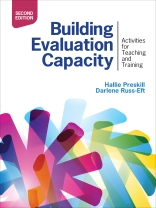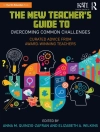The
Second Edition of
Building Evaluation Capacity provides 89 highly structured activities which require minimal instructor preparation and encourage application-based learning of how to design and conduct evaluation studies. Ideal for use in program evaluation courses, professional development workshops, and organization stakeholder trainings, the activities cover the entire process of evaluation, including: understanding what evaluation is; the politics and ethics; the influence of culture; various models, approaches and designs; data collection and analysis methods; communicating and reporting progress and findings; and building and sustaining support. Each activity includes an overview, instructional objectives, minimum and maximum number of participants, range of time required, materials needed, primary instructional method, and procedures for facilitators to help learners in the most common evaluation practices.
Table des matières
1. Overview of Evaluation
Definition of Evaluation
Evaluation Logic
Types of Evaluation
History of Evaluation
Evaluation Versus Research
Resources
2. The Politics and Ethics of Evaluation Practice
The Politics of Evaluation Practice
The Ethics of Evaluation Practice
Resources
3. Culture and Evaluation
Definitions
Resources
4. Focusing the Evaluation
Resources
5. Evaluation Models, Approaches, and Designs
Evaluation Models and Approaches
Evaluation Designs
Return-on-Investment Designs
References and Resources
6. Issues of Validity and Sampling
Reliability and Validity
Sampling
References and Additional Resources
7. Collecting Evaluation Data
Choosing Among Data Collection Methods
Surveys and Questionnaires
Individual and Focus Groups Interviews
Observation and Archival Data
Resources
8. Analyzing Evaluation Data
Qualitative Data Analysis
Quantitative Data Analysis
Resources
9. Communicating and Reporting Evaluation Processes and Findings
Why Communicate and Report?
Who Are Your Communicating and Reporting Stakeholders?
When and Why Are You Communicating and Reporting?
Resources
10. Managing the Evaluation
Developing an Evaluation Budget
Anticipating and Handling Evaluation Challenges
Resources
11. Building and Sustaining Support for Evaluation
References and Resources
12. Reflections on Learning
A propos de l’auteur
Darlene Russ-Eft, Ph.D., is Professor Emeritus of Adult and Higher Education, College of Education, Oregon State University (OSU). She received her BA from the College of Wooster in psychology and her MA and Ph D from University of Michigan in cognitive psychology. She worked for international training companies as director of research before joining OSU, where she teaches doctoral and master’s courses to senior leaders and practitioners. Her research focuses on issues related to leadership development and HRD program evaluation. Her most recent book is titled Managing Social Science Research (2017, Wiley). She is past president of the Academy of Human Resource Development (AHRD); past board member of the American Evaluation Association; and past editor of Human Resource Development Quarterly. In her previous role with international training companies and as a director for the International Board of Standards for Training, Performance, and Instruction (ibstpi R), she has undertaken several studies examining global competencies related to HRD. She has received several awards for her research, including the Times Mirror Editor of the Year Award, the ASTD (now ATD) Research Article Award, and the AHRD Scholar Award. She was also inducted into the AHRD Hall of Fame.












